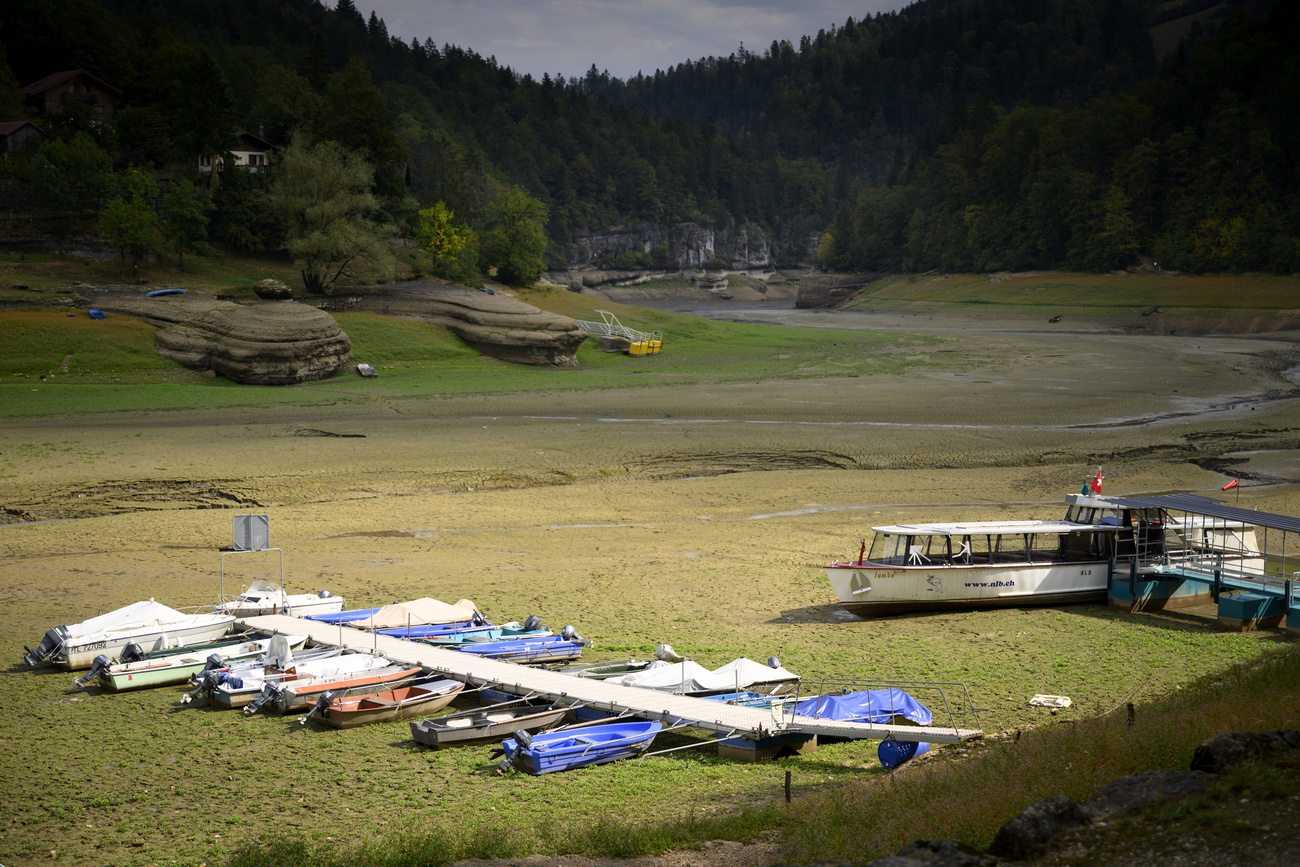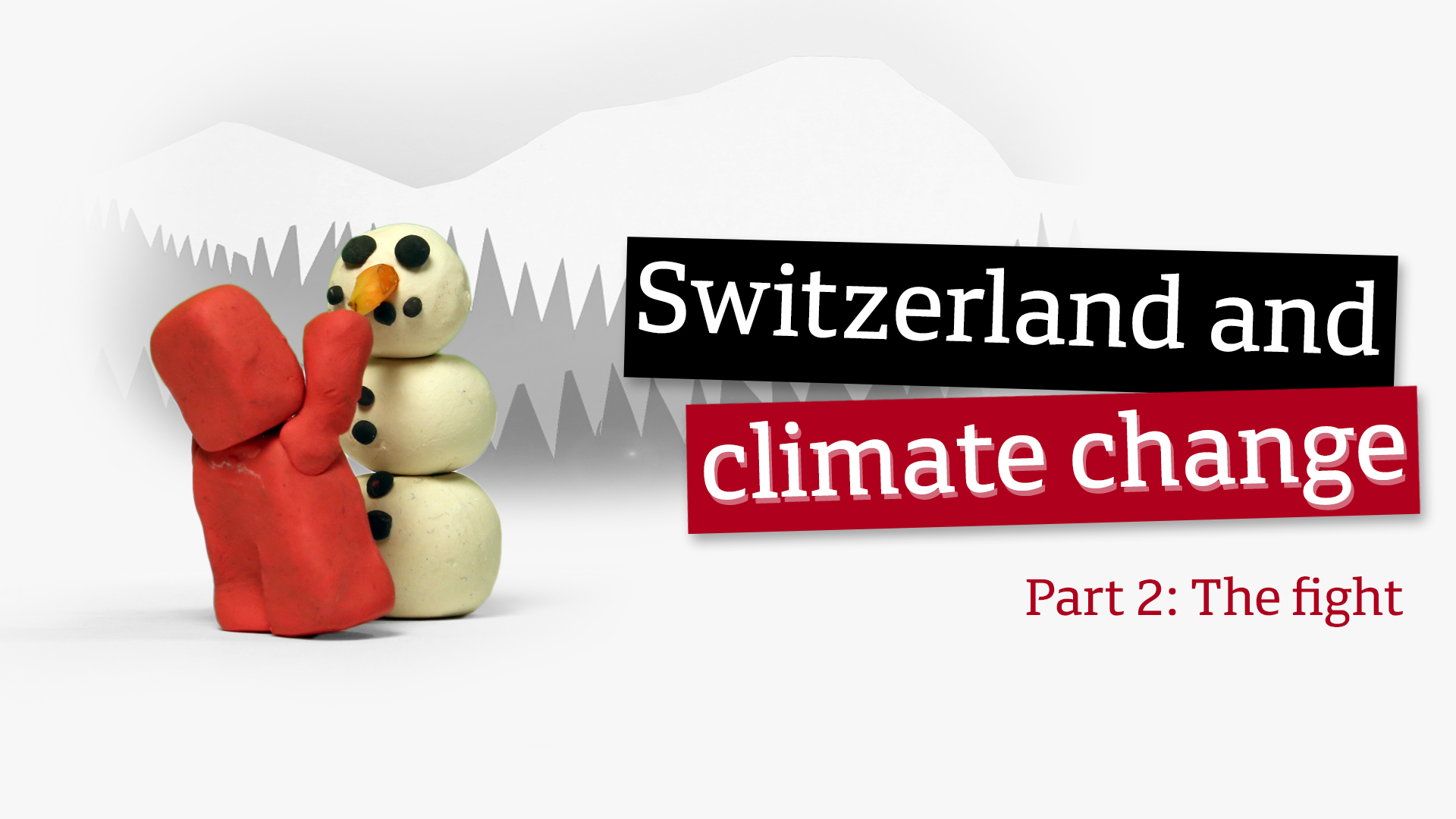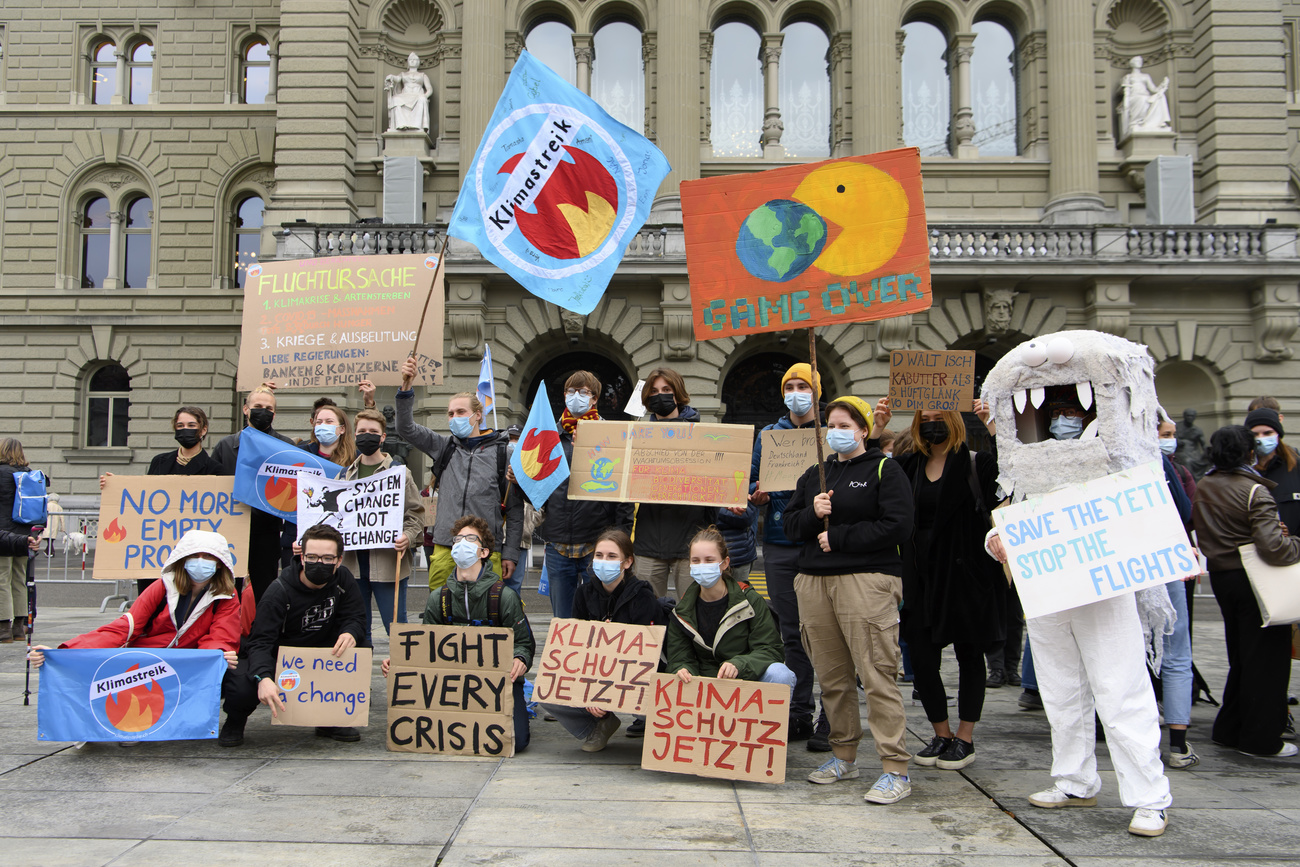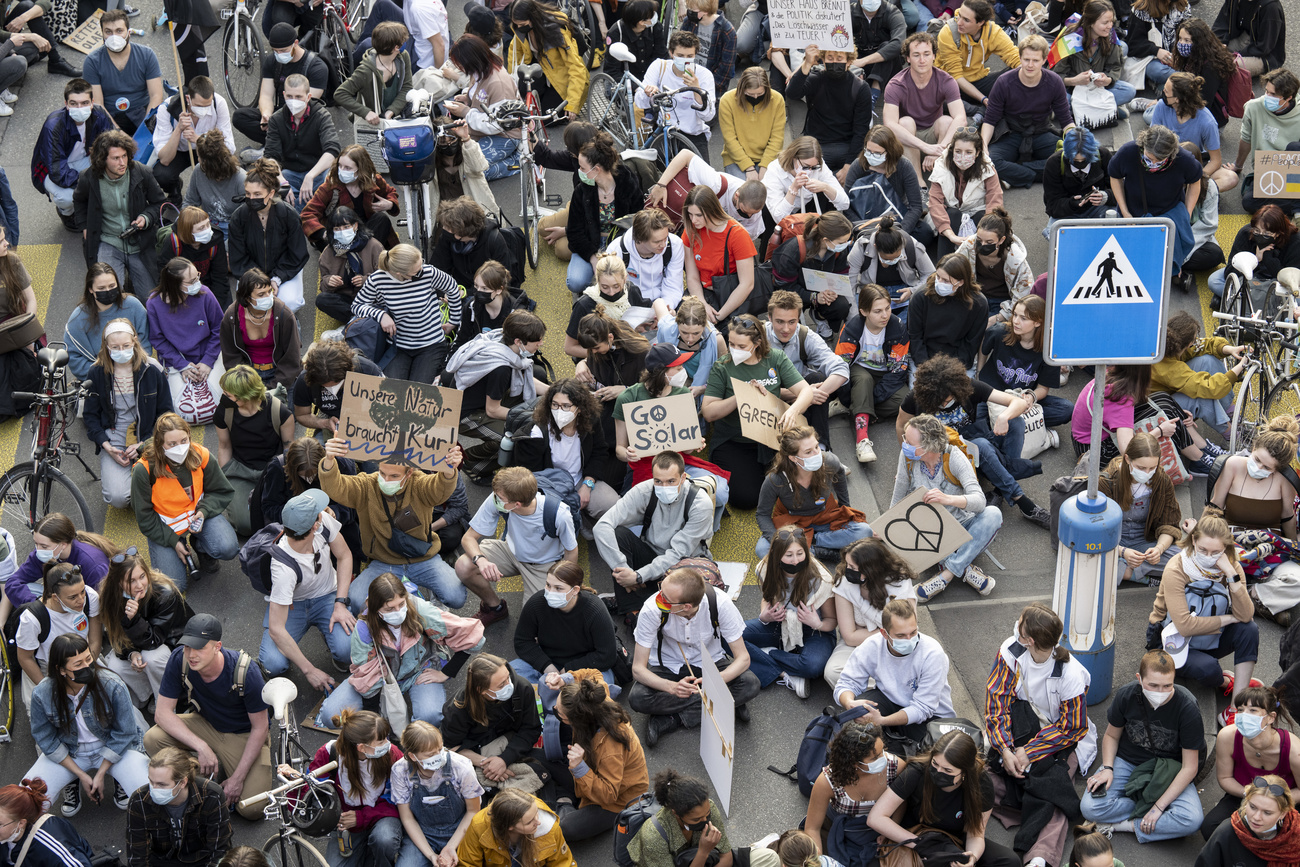
Rebellious (but pragmatic) climate movements

Movements active in fighting climate change are mobilising ahead of the Swiss federal elections taking place in October. Their relationship to institutional politics is less dogmatic than that of previous generations.
At the end of January, a group under the name Doctors for Extinction Rebellion, an offshoot of Extinction Rebellion, which is made up of about 40 carers from the canton of Neuchâtel, sent the government a batch of postcards warning of the dangers of extreme climate change on health. “What if we worked together to create a more resilient health system that respects life?” they asked the authorities.
Since the beginning of this year, Extinction Rebellion, a British-based movement with international offshoots, has opted for a softer approach to capture the attention of the public and politicians than the usual shock-tactics. It still targets decision-making centres, but this time it is also explicitly seeking to change policy from within.
Actions characterised as civil disobedience are often perceived negatively by the population. Attacks on paintings by environmental activists in several European museums have fuelled debate in recent months and have often provoked criticism.
More pragmatic activism
In Switzerland, Extinction Rebellion is now proposing citizens’ assemblies to better respond to environmental challenges. This is the case in Geneva, where political parties have been invited to get familiar with these public spaces, where the population of a city can express its wishes, ideas and objections.

More
Elderly Swiss women bring European court’s first climate case
Marco Giugni, a professor of political science at the University of Geneva, says, “The activism of these movements and their members is nowadays more pragmatic. In the early anti-nuclear struggles against the Kaiseraugst power plant in the mid-1970s, for example, the struggle was mainly ideological.”
“Our studies show young people today are less reluctant to shoulder political responsibility and adopt behaviour to suit their campaigns, particularly in terms of mobility, while staying true to their mission,” Giugni adds. “So, they take every opportunity available. I see them as less anti-establishment than in the past.”
A ‘sometimes ambiguous’ position
Many former activists, some of whom are still an active part of the movement, sit in cantonal or municipal parliaments. Launched in 2018 at the initiative of the Swedish activist Greta Thunberg, the “Fridays for Future” movement illustrates how the climate movement has gained wide entry into traditional political bodies.

More
Switzerland plummets down international climate rating
“Several of our members have joined political parties, but not the majority,” says Robin Augsburger, 25, a climate activist from the town of La Chaux-de-Fonds in the canton of Neuchâtel. This strategy creates ambiguity because it is difficult, in his view, “to denounce the actions of official political institutions with climate activists in their ranks”.
Climate activists have joined the Green Party, the Social Democratic Party or Solidarités, a far-left party. But also, surprisingly, right-leaning parties like the centre (Liberal Greens) and even right-wing parties. “Young Radicals joined us at the beginning,” Augsburger says. “But the Covid era decimated our ranks.”
When politicians fail to move fast enough, activists turn to referendums and parliamentary motions to push policies forward. Several motions have been put forward by the Neuchâtel division of Fridays for Future, calling on the canton to take action to secure a viable and just future and invest sustainably. Many of these motions have been accepted by the local parliament.
At the crossroads
The co-president of the Young Greens, Margot Chauderna, points out the links between rebel movements and the political class. “Many of us were politicised by the big climate strikes of 2019,” she says. “Our party is situated at the crossroads between institutional politics and radical activism.”

More
How Switzerland is trying to combat climate change
This activism targets big polluters, multinationals and the ultra-rich. The Green party’s members participate in the Fridays for Future, Strike for the Future and women’s strike, along with other movements willing to use civil disobedience as a means of action. Chauderna is herself a member of the Fribourg legislature and a former member of the organisation behind the women’s strike.
In Geneva, where new cantonal authorities will be elected in April, activists are also seeking to project themselves into the political arena. One such example is Antoine Mayerat, who is running for parliament because he is “disappointed at the lack of action and wants to change that”.
‘A question of survival’
Relations between the political sphere and movements such as Extinction Rebellion, Fridays for Future or Renovate Switzerland are simultaneously close and distant. Many young people who are ideologically engaged are deeply mistrustful of institutional politics, which can lead them to become depoliticised.
More
“If institutional politics are incapable of dealing with this emergency, how can I entrust my life to politicians who cannot take action? It’s simply a question of survival,” says Cécile Bessire, a spokeswoman for Renovate Switzerland, a movement with a core group of about 100 activists in Switzerland that engages in non-violent civil resistance.
“We won’t campaign ahead of the federal elections,” she says. “But I will vote. It’s my personal choice. Everyone is free.” She does not know yet which party she will cast her ballot for.
The limits of elective democracy
Mistrust of the political institutions is even more evident among the Neuchâtel branch of Doctors for Extinction Rebellion, the group which has been involved in local politics for a year and a half.

“We have no interest in the elections because elective democracy has reached its limits due to the inability of political institutions, driven by lobby groups and the constant desire to be re-elected, to take courageous and necessary decisions in the interests of the population,” the Neuchâtel collective said in an anonymous response explaining its rejection of institutional politics.
“Our goal is not to get elected, our action aims to exert pressure from outside without any specific intermediary,” the collective says. But according to these activists in white coats, a change in the political system is necessary. “This is why we think that citizens’ chambers or assemblies are the best option. Let’s hope that initiatives will be taken in more municipalities and cantons. This is one of the only solutions to move things in the right direction – at the federal level, too.”

More
Dip in political fervour reported among Swiss youth
As such, it seems the streets will remain the preferred battlefield for young people committed to protecting the climate in the coming months. Several large-scale events will be held during the election year, including climate marches. Scientist Julia Steinberger, co-author of the latest report of the Intergovernmental Panel on Climate Change (IPCC), is preparing a “Blue March” from French-speaking Switzerland to Bern in April along with other fellow activists. It will culminate in a march under the windows of the Federal Palace, the centre of political power in Switzerland.
Edited by Samuel Jaberg/ds

More
Swiss CO2 law defeated at the ballot box

In compliance with the JTI standards
More: SWI swissinfo.ch certified by the Journalism Trust Initiative































You can find an overview of ongoing debates with our journalists here . Please join us!
If you want to start a conversation about a topic raised in this article or want to report factual errors, email us at english@swissinfo.ch.